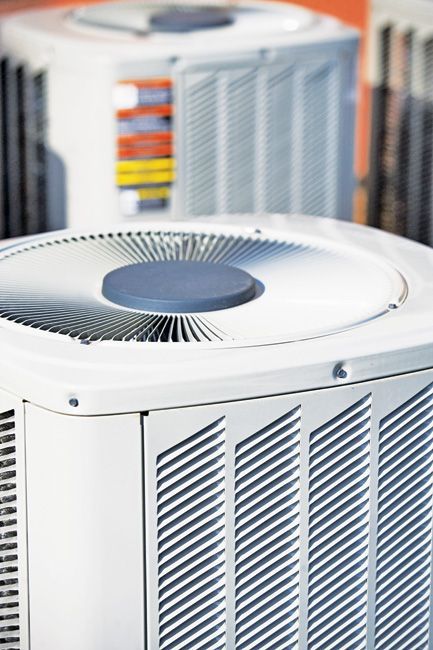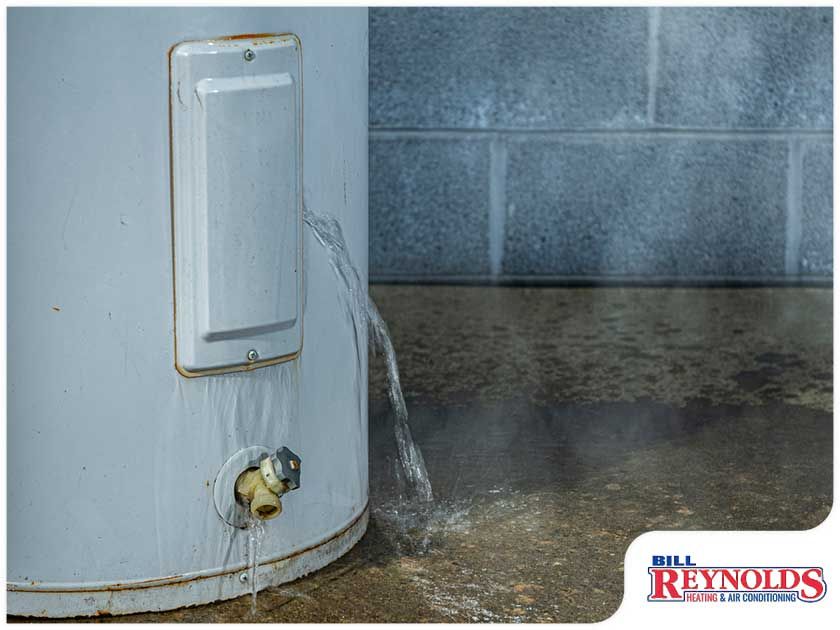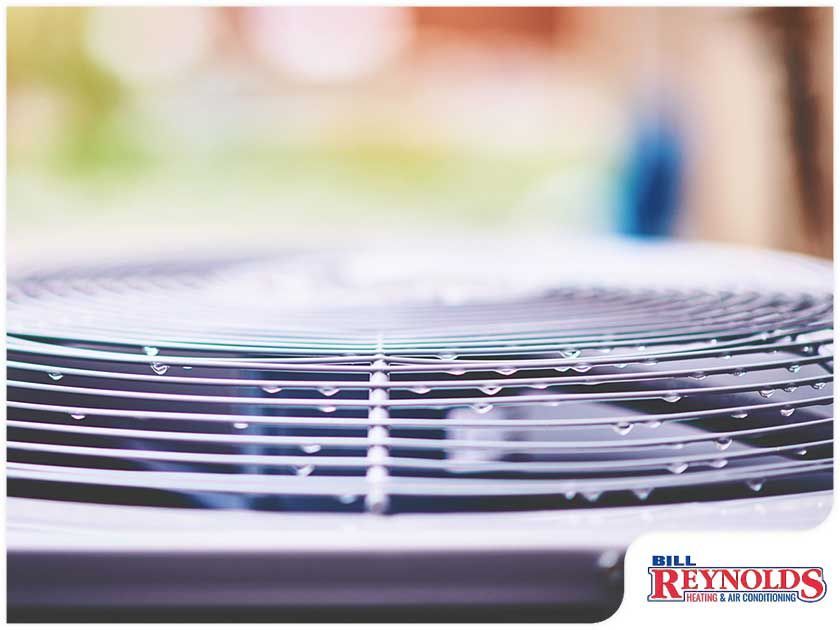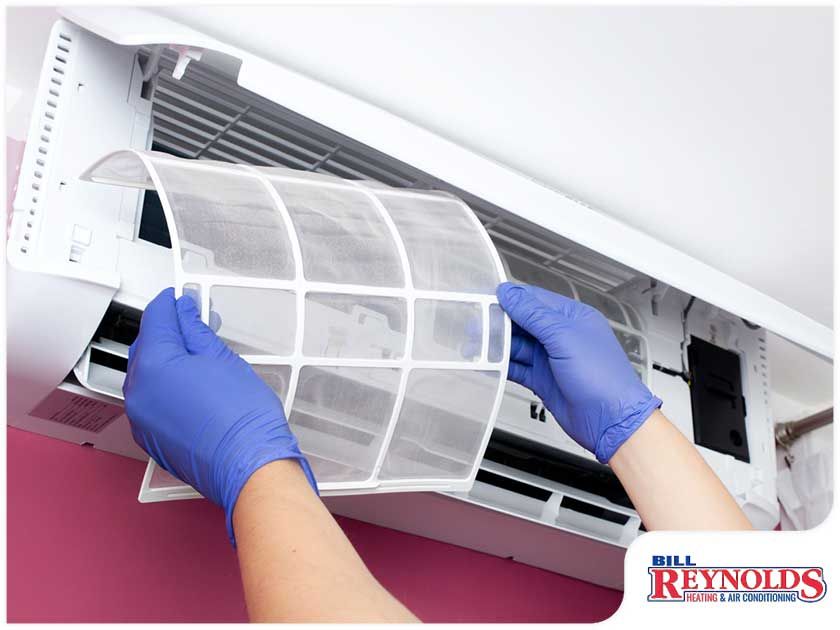OUR RESOURCES

A particularly bad joke: “The inventor of the air conditioner had died. His funeral was attended by thousands of fans.” Kidding aside, maintaining your air conditioner properly extends the life of your unit and ensures a cool and comfortable environment all summer long. For the record, the air conditioner was invented by Willis Carrier, an engineer and founder of Carrier Corporation, maker of some of the best HVAC systems in the industry. Another family owned and operated company that honors its namesake is Bill Reynolds Heating & Air Conditioning. It is operated by Bill’s daughter Denise and grandson Devon, and is one of the few truly locally owned operations left in the area. “I think people would be surprised if they knew when they call some HVAC companies with a family name on the truck, it’s actually owned by a national corporation,” says Denise. “With us, you’re getting the same highly trained technicians who have been with us for years. We do not hire subcontractors. You’ll reach the same person answering the phone during business hours and a live person for service after hours. And we still do business the way my father did when he founded the company in the 1958, treating clients like family and operating with honesty, integrity and trust.” All About Air Conditioning “It’s just as important to have an annual preventative maintenance appointment for your AC as it is your vehicle,” says Denise. “Our technicians inspect and keep equipment in optimal shape, often identifying a part before it fails, to avoid emergency outages.” Denise and Devon recommend not waiting until a 90-degree day to turn on your air conditioning for the first time. “By that time, you’re desperate for cool air, and if it doesn’t work, our schedule may be jammed,” he says. “It’s best to turn it on that first 70-degree day and setting it to 68 degrees. Then go to all the rooms in your home and see if they are cooled.” When the tech comes for a maintenance appointment, they will make sure all the parts are operational, clean the condenser, and check the filter and your refrigerant level. Bill Reynolds also offers and installs electronic air cleaners, UV purifiers or whole-house humidifiers to keep your breathing environment as healthy as it can be. “As a Carrier Factory Authorized dealer, our techs have to undergo an additional level of training,” she adds. “This makes them especially skilled when it comes to helping customers get the most out of their warranties, replacing parts while they are still under warranty if possible. We also handle the claim process for them.” As a full-service company, Bill Reynolds has a skilled plumber on staff, too. “He is invaluable in many situations that arise this time of year,” she says. “He works on lots of pool heaters and gas lines, as well as snaking drains.”

One of the most important appliances in your house is the water heater. A properly-functioning water heater is extremely vital in most modern homes. Water heaters usually come in two forms: one that has a storage tank to make heated water available at any given time, and another which is a tankless type that only heats water when you need it. In any case, homeowners should know how long water heaters last. However, even with regular water heater maintenance, it can be difficult to determine when it’s time to have them replaced. It’s also important to note that the lifespan of your water heater may depend on the type and quality of the unit. Bill Reynolds Heating & Air Conditioning, a top-quality provider of furnace installation services, shares a guide to the service lifespan of your water heater in this post. What Is the Average Lifespan of a Water Heater? Many factors can impact the life expectancy of your water heater. Along with its age and level of maintenance, you also need to consider the quality of the water and the level of regular usage. While it’s possible for your water heater to outlast average estimates, there are certain expectations on how long your water heater can last. For instance, a traditional water heater has an average lifespan of eight to 12 years. Thanks to a process called electrolysis, an anode rod protects the interior lining by attracting all corrosive particles to itself inside the tank. However, once the rod has corroded to the point that it can no longer function, those particles will settle at the bottom of the water tank and eventually destroy the lining. When corrosion begins inside the tank, the water heater is beginning to near the end of its lifespan. A tankless water heater, meanwhile, can last up to 20 years. With regular heating service maintenance, it can even last longer than that. This is because these water heaters don’t have to work continuously to maintain a supply of hot water. However, since they don’t use anode rods, tankless water heaters can suffer from corrosion over time. If you don’t know what type of water heater you currently have, there are other ways to determine its age. One of these is checking the serial number of your appliance. The serial number, which is typically located on the upper portion of the water heater, consists of a letter followed by a set of numbers, which establishes the date it was manufactured. The letter usually stands for the month: “A” for January, “B” for February, and so on. When you see a serial number that starts with “A12,” this means your appliance was manufactured in January 2012. While this method can be applied to most water heaters, you can also reach out to the manufacturer just to be sure. What Are the Signs You Need to Replace Your Water Heater? To ensure your water heater continues functioning effectively, it’s best to have an expert plumbing and air conditioning repair technician perform professional inspections. They’ll examine your unit and perform the necessary repairs. Without regular maintenance, your water heater may suffer from wear and tear that causes premature deterioration. Even if your water heater has a few years left in it, you may need to consider replacing your unit if you notice any of the following signs: Inconsistent temperatures. If your heater is on but you’re still getting cold water, your unit may not be as functional as it once was. Before you call a professional, closely examine the connections to and from the water heater. Check the insulated pipes and the temperature settings as well. If you have a gas-heated unit, check if the pilot light is still lit. Avoid striking a match if you notice a very strong gas smell. Rusty, brownish water. Tinted, rusty hot water that’s either brown or yellow in color can mean two things: your water heater is rusting on the inside, or your home’s pipes are rusty. It’s also important to determine whether the discoloration appears while the cold water is running. If it doesn’t, the corrosion problem probably originates from inside the water heater instead of the pipes. At any rate, be sure to call a professional heating service technician. Water that has a strange odor. The hot water coming out of the heater can smell off or taste weird. This means that something is contaminating the contents of the water tank. It could be a piece of metal that’s been absorbed into the water, or bacteria accumulating inside the tank. Before you start panicking, try cleaning your water heater tank. If this doesn’t solve the problem, it’s time to call a plumber. Pooling water or leaks. Water pooling around your water heater is never a good sign. As such, you should immediately call a heating or air conditioning repair company to have it checked out. If you notice pooling water around the base of your tank, be sure to check if the leak is coming from a fitting or valve that needs to be tightened or replaced. If the leak comes from the tank itself, there may be interior cracks. Banging or rumbling noises. Most manufacturers recommend flushing a traditional water heater annually, but only a few homeowners follow this advice. If you don’t, sediment can build up in your water heater as time goes by. As you heat it over and over again, the sediment can harden and eventually start shifting around. This causes rumbling or gurgling noises. Make certain not to overlook these banging noises, as this problem can lead to overworked water heaters, leaks, internal damage and more. A decrease in hot water. In addition to rumbling noises, the buildup of sediment can decrease the space inside the tank over time. As a result, you may notice that there’s less hot water than there used to be. If the hot water runs out more quickly than before, you may need to drain or clean your tank. Waiting too long to clean it can compromise the overall health and efficiency of your water heater.

A quality outdoor HVAC unit can withstand harsh outdoor elements and weather conditions. However, there's only so much that your equipment can take. That's why it still pays to be prepared for what nature brings. After a storm, you must have your unit checked by a cooling and heating service provider, even if it looks fine from the outside. Can Rain Damage Your HVAC System? It's usually safe to use your air conditioner or heater even if it's raining heavily outside. The real issues begin when the unit gets exposed to water when it floods. Water can damage electrical components, the wiring and the motor. Your HVAC system can still perform well even during a storm, but not when it gets submerged in water. Moreover, even the best HVAC equipment can sustain damage from heavy debris during extreme weather events. High-speed wind-blown objects can also put your equipment at risk. Routine tune-ups and inspections can help you save on air conditioning repai r costs and keep your unit performing optimally. Should You Cover Your Outdoor HVAC Unit? Experts don't recommend covering outdoor HVAC units since the inner condensers can resist exposure to moisture and extreme temperatures. Also, moisture is likely to evaporate before corrosion occurs and harms internal components, assuming there’s natural ventilation. However, many people still cover their outdoor units during the colder months for protection against snow and debris. Unfortunately, doing this can keep moisture from evaporating, speeding up the deterioration of various system components. A quality outdoor HVAC unit can withstand harsh outdoor elements and weather conditions. However, there's only so much that your equipment can take. That's why it still pays to be prepared for what nature brings. After a storm, you must have your unit checked by a cooling and heating service provider, even if it looks fine from the outside.

Your indoor air quality can be influenced by many things in your home, such as furniture, cosmetic products and air fresheners. According to the U.S. Environmental Protection Agency (EPA), the amount of air pollutants in your living space can be up to five times greater than what’s outside. This is one of the many reasons you should include indoor air quality on your list of priorities. One way to minimize pollutants indoors is by choosing the right HVAC filter. Here’s a quick guide to help you select the right one. Know which type of filter is suitable for your HVAC system. The first thing you need to do is to determine the ideal type of filter for your HVAC system. You can usually find the recommended filter for your equipment in the manufacturer’s manual. Make sure to get filters that are fit for residential use and can remove the greatest amount of pollutants without affecting your unit’s airflow. If you’re not sure which filters to use for your equipment, HVAC maintenance experts at Bill Reynolds Heating & Air Conditioning can help you choose. Disposable filters are the most common type that homeowners use. You can also get washable ones that you can clean and re-use every few months. However, you usually have to maintain washable filters more frequently, and they’re not as effective as disposable filters. Meanwhile, electrostatic filters utilize electricity to catch tiny particles, and you can get them in both disposable and washable variants. Look into filter MERV ratings. The Minimum Efficiency Reporting Value (MERV) rating measures how well an HVAC filter can trap indoor air pollutants. This rating ranges from one to 16, and the higher the number is, the more particles the filter can catch. For residential use, the highest recommended MERV rating is 12. Anything higher than that value is meant for commercial structures, such as hospitals and laboratories. Disposable fiberglass filters usually have a two or three MERV rating, while washable filters have a rating of between one and four. Disposable pleated filters are a great option for homes since they have a MERV rating of six to 12. This is the same for electrostatic pleated filters, which have a MERV rating of around eight to 12.

Common Challenges With Cooling Basements Increased humidity. Areas prone to increased humidity require sufficient ventilation to prevent moisture-related issues like poor indoor air quality, corrosion, mold growth and rot. Excessive moisture can also cause bad odors and lingering smells. Added square footage. A finished basement adds to the square footage that your HVAC system has to cool and heat. If your home’s square footage goes beyond the equipment’s capacity, it will need to work harder to keep you comfortable. As a result, your energy bills will increase, and your comfort will suffer. The added load can also strain several system components, leading to more frequent malfunctions. You can save on air conditioning repair costs by choosing a unit that’s correctly sized for your home. Insufficient or no windows. Another common challenge in cooling finished basements is the number of windows. Some basements have small windows placed higher up in the room, while others don’t have any at all. A lack of windows can result in poor airflow, which can contribute to moisture-related problems. What Can You Do About These Issues? Use a dehumidifier. Increased humidity can warm up your basement, making it harder for your HVAC system to cool the space. Since this part of your home is usually more humid than other areas, you can keep heat and moisture levels down by running a dehumidifier. This equipment will eliminate excess humidity from your basement, helping cool your basement and making its environment more pleasant. Moisture from your basement will accumulate in the dehumidifier, which you’ll need to drain from time to time. Encourage good airflow. The U.S. Environmental Protection Agency says that there are usually two to five times the amount of air pollutants indoors than outdoors. Sometimes, these levels can even be up to 100 times higher, meaning the air you breathe indoors may not be as clean as you believe. When the air can’t circulate properly in your basement, these pollutants will remain and collect in the air. What you can do is have a cooling and heating service provider place HVAC equipment in your basement if it doesn’t have any. Doing this will help keep the area comfortable like the rest of your house. However, if adding HVAC equipment isn’t an option, you can have fans installed instead. If your basement’s ceiling is too low to install ceiling fans, consider tabletop or floor fans to keep air circulating throughout the space. Keep the sun at bay. Do you have windows in your basement? If so, try to limit the amount of sunlight that enters the room during the day. You can easily do this with blackout curtains, which you can purchase at most major retail stores. This window treatment will keep the sun from penetrating your space, helping it stay cool, especially during the warmer months. Improve your indoor air quality. Regardless of what equipment you use to cool your basement, maintaining good indoor air quality is a must. Invest in a high-quality air purifier with a HEPA filter to minimize dirt, dust and other pollutants. Usually, air purifiers feature an activated carbon filter to catch smaller particles. Installing this equipment goes a long way in keeping the air you breathe indoors as clean as possible. As an experienced air conditioning repair and installation company, you can count on Bill Reynolds Heating & Air Conditioning to help you improve your indoor air quality. What Are Your Options? What if You Can’t Extend Your Current HVAC System? The most common option for homeowners to finish their basement is extending their existing HVAC system. While this is the customary choice, it’s not necessarily the easiest one. You need to consider various factors before extending your current unit. You’ll need to hire a cooling and heating service provider for an inspection. They can tell if your existing equipment can handle the added load from your basement. If your unit is old, there is a greater chance that it’s already met its full capacity and can’t take on the added square footage from the basement. If your current HVAC unit isn’t capable of heating and cooling your basement, you can choose one of two routes: either upgrade your existing equipment or install another HVAC system meant only for cooling your basement. What Happens if Your Current HVAC System Can Be Extended? Once your technician determines that your existing HVAC system can cool your basement, all you need to do is have your ductwork extended. This is the easiest way to bring conditioned air to this part of your house. The best time to install additional ductwork is during the early stages of your basement finishing project. Your technician will attach extensions and registers to the main supply. They can hide the new ductwork between the joists of the unfinished ceiling or within future built-in closets. Consider the Needs of Your Basement and Household Consider the needs of your basement before installing new HVAC equipment. What is the function of this space, and how frequently are you going to use it? Does it have a bedroom, bathroom, entertainment area or home gym? How many family members do you have, and do you live with aging loved ones? Do you have pets at home? Once you have a clear idea of what your space and family need, you’ll find it easier to determine which cooling options are ideal for you.

